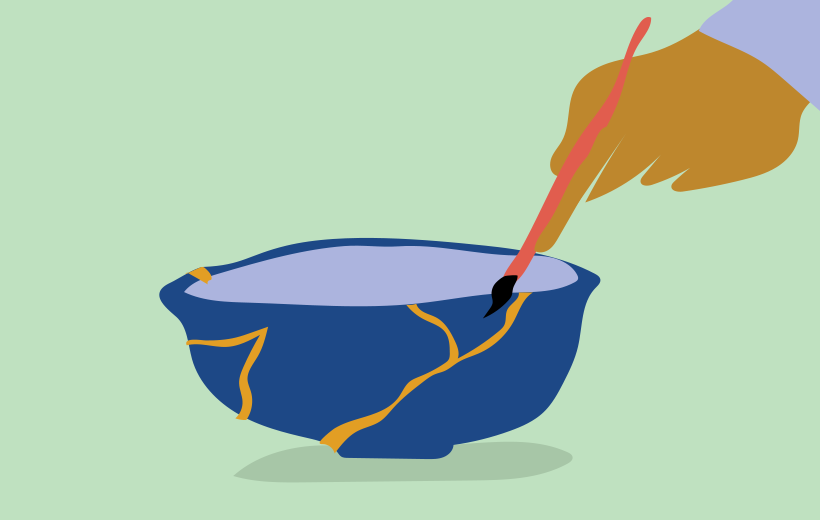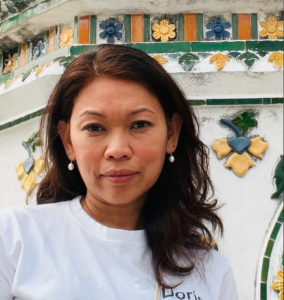Navigating Conflict: Abandon, Transform, Transcend
By Emilda Rahim • 3 min read
By Emilda Rahim • 3 min read

YOU MAY HAVE HEARD OF the Japanese art of kintsugi. When pottery breaks, it is not thrown away. Instead, the cracks are filled with gold, silver, or lacquer. Each fracture is traced, illuminated rather than erased. The bowl becomes more beautiful not despite its imperfections, but because of them. The flaw becomes the form.
Now that I’m older, I love the idea of seeing ourselves as a kind of kintsugi bowl. For me, meditation and dharma became the gold and silver thread. They didn’t erase the past or the scars, but they helped me hold them differently.
Conflict in relationships can leave you feeling broken, especially with those you expect to be naturally caring and loving. Sometimes it begins with a misunderstanding. An inappropriate phrase used at the wrong moment. A look that carries weight. These small moments can turn into heavy emotional storms. Your mind gets stuck, your chest tight, your words tangled.
In the language of Buddhism, these storms are called kleshas, mental and emotional afflictions like anger, grasping, and pride. Mingyur Rinpoche says they are like clouds in the vast sky of our innate awareness and are temporary, passing, insubstantial. But in the moment of hurt, they feel anything but. The suffering feels permanent, the story feels true, and we feel wronged.
Abandon: The Wisdom in Stepping Away
After leaving my home country in my twenties, married into and living across different cultures, I often felt fractured along invisible lines. I was caught between expectations, perceptions, and subtle judgments. When the tensions inside me became too much, dealing with unspoken rules I couldn’t follow or the feeling that my presence never quite fit, I withdrew. Sometimes with drama, mostly with silence. I removed myself from group messages. I stopped responding. I stopped trying. I felt the righteousness of being the victim.
From the outside, it may have looked calm. But inside, I was a storm, unpredictable, exhausted. I told myself it was better for everyone. And maybe it was. Sometimes, not adding more fuel to the fire is the kindest thing we can do.
Abandoning, as described in Mingyur Rinpoche’s monthly teaching, was removing the source of conflict from my environment. I didn’t know it then, but it was also the beginning of clarity and the cultivation of genuine loving-kindness. For many years, when I sat in meditation, the tension lingered. That’s when I understood: physical distance can’t untangle the knots in the heart. Letting go had to happen by allowing awareness to meet what I had avoided. When we allow ourselves to feel what we resist, insight becomes possible.
“Then one day in meditation, something shifted. Spacious. Uncomplicated. Joy and sorrow, love and rejection, they started to blend into each other.
I didn’t need a story to “heal.” The identity I had clung to — the one who had been wronged — faded. What remained was presence. Not perfect. Not enlightened. But enough.”
— Emilda Rahim
With time and practice, something changed. The sharp words lost their edge. I couldn’t recall the exact phrases that had hurt me, the precise moments I had replayed so many times. What lingered was something more essential: the heaviness of holding on to aversion.
It almost didn’t matter who was right. Any stance built on “me versus them” left me smaller and more constricted. Dharma teaches that transformation is what happens when we stop resisting and begin to see clearly. I stopped trying to fix the story. I allowed myself to feel the grief of what had been lost, and something softened.
Forgiveness didn’t arrive like a revelation. It arrived quietly, as a release. Not because the past changed, but my view of it did. This is neuroplasticity in spiritual language: a new pattern, a new holding.
Then one day in meditation, something shifted. Spacious. Uncomplicated. Joy and sorrow, love and rejection, they started to blend into each other.
I didn’t need a story to “heal.” The identity I had clung to — the one who had been wronged — faded. What remained was presence. Not perfect. Not enlightened. But enough.
The storm hadn’t disappeared. But it no longer defined me. In fact, it became support for deepening my compassion and loving-kindness for the object of my past anger.
If you’ve ever felt like an outsider or found yourself caught in conflict in your family, your work, or your own mind, you’re not alone. I’ve walked that path too. And what I’ve come to understand is this: our cracks are not failures. They are where the light enters. Even when the sky is clouded, it never stops being sky.
This path, abandon, transform, transcend, is not about striving. You might flow forward, circle back, rest for a while. It doesn’t matter. What matters is returning, not to the past, but to your innate goodness.
July 2025

Emilda Rahim is the Chief Operating Officer of Tergar International, where she is committed to making Mingyur Rinpoche’s teachings accessible to individuals around the world. With a Master’s in Executive Coaching and 29 years of experience in organization and human resource management, Emilda combines strategic leadership, operational expertise, and community building to foster growth and transformation in individuals and Tergar communities. Her extensive career reflects a deep commitment to cultivating meaningful connections and creating inclusive spaces where people feel supported and inspired.
Learn meditation under the skillful guidance of world-renowned teacher Yongey Mingyur Rinpoche at your own pace.


“Compassion has a support team and never stands alone. It is infused with awareness that allows our hearts to be open and steady. When we feel connected, kindness naturally arises. With wisdom, we can see what’s happening clearly; we don’t try to do the impossible but see what we can do to meet the situation.”…

If you have more than one person in a room, you’ve automatically got more than one set of opinions and ideas there, too. And, generally speaking, you’re in a room full of folks secretly thinking that their ideas are best of the lot.

“I kept worrying about my “incorrect” meditation practice. I just knew I was not doing it right! This feeling remained an undercurrent — not debilitating but present — until I encountered the Joy of Living with Mingyur Rinpoche.” — Ingrid White-Wilson
If you enjoyed reading our articles, please join our mailing list and we’ll send you our news and latest pieces.